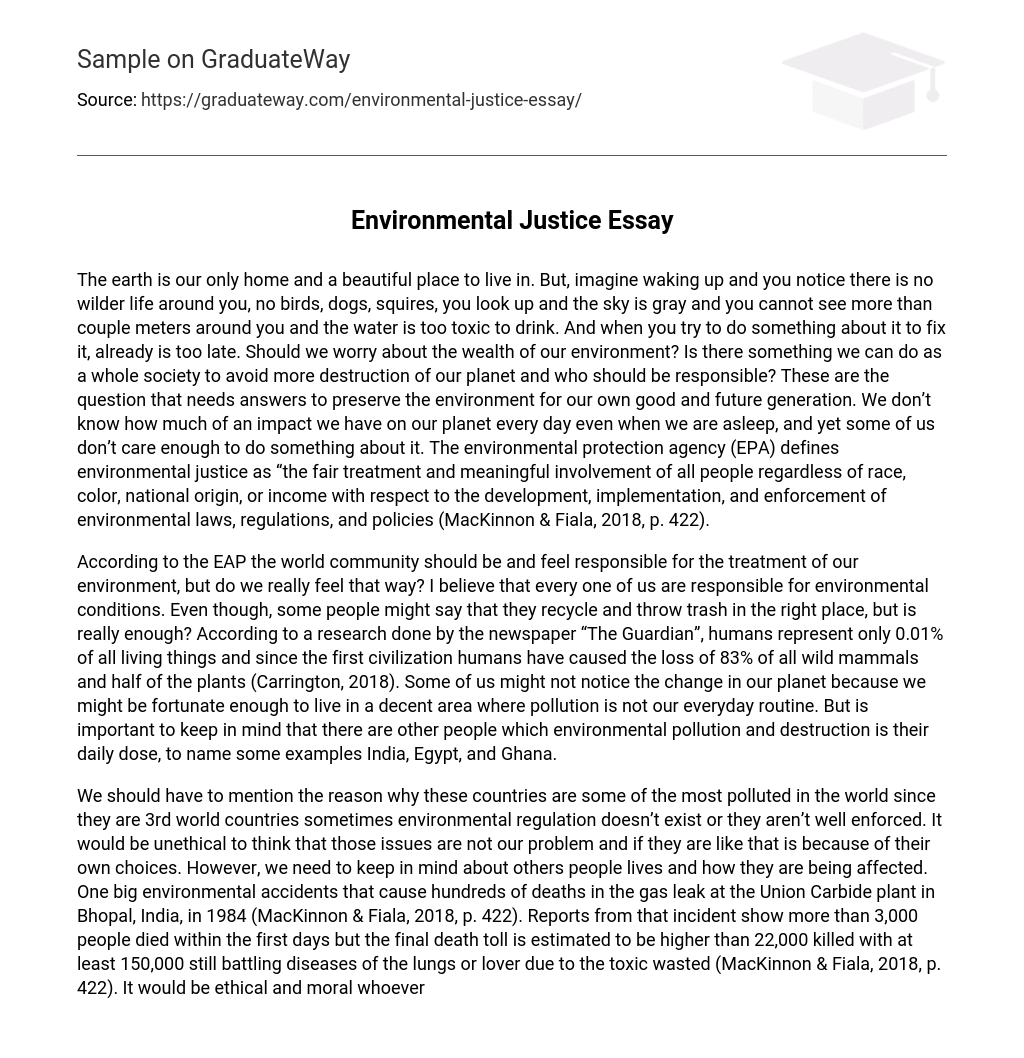The earth is our only home and a beautiful place to live in. But, imagine waking up and you notice there is no wilder life around you, no birds, dogs, squires, you look up and the sky is gray and you cannot see more than couple meters around you and the water is too toxic to drink. And when you try to do something about it to fix it, already is too late. Should we worry about the wealth of our environment? Is there something we can do as a whole society to avoid more destruction of our planet and who should be responsible? These are the question that needs answers to preserve the environment for our own good and future generation. We don’t know how much of an impact we have on our planet every day even when we are asleep, and yet some of us don’t care enough to do something about it. The environmental protection agency (EPA) defines environmental justice as “the fair treatment and meaningful involvement of all people regardless of race, color, national origin, or income with respect to the development, implementation, and enforcement of environmental laws, regulations, and policies (MacKinnon & Fiala, 2018, p. 422).
According to the EAP the world community should be and feel responsible for the treatment of our environment, but do we really feel that way? I believe that every one of us are responsible for environmental conditions. Even though, some people might say that they recycle and throw trash in the right place, but is really enough? According to a research done by the newspaper “The Guardian”, humans represent only 0.01% of all living things and since the first civilization humans have caused the loss of 83% of all wild mammals and half of the plants (Carrington, 2018). Some of us might not notice the change in our planet because we might be fortunate enough to live in a decent area where pollution is not our everyday routine. But is important to keep in mind that there are other people which environmental pollution and destruction is their daily dose, to name some examples India, Egypt, and Ghana.
We should have to mention the reason why these countries are some of the most polluted in the world since they are 3rd world countries sometimes environmental regulation doesn’t exist or they aren’t well enforced. It would be unethical to think that those issues are not our problem and if they are like that is because of their own choices. However, we need to keep in mind about others people lives and how they are being affected. One big environmental accidents that cause hundreds of deaths in the gas leak at the Union Carbide plant in Bhopal, India, in 1984 (MacKinnon & Fiala, 2018, p. 422). Reports from that incident show more than 3,000 people died within the first days but the final death toll is estimated to be higher than 22,000 killed with at least 150,000 still battling diseases of the lungs or lover due to the toxic wasted (MacKinnon & Fiala, 2018, p. 422). It would be ethical and moral whoever was responsible to serve justice or take responsibility for it, but unfortunately, the supervisors who were found guilty for negligence for the incident only received minor fines and punishment and the chairman of Union Carbide never received any punishment. Even in 2012, an American court dismissed a lawsuit filed by Bhopal residents against Anderson and Dow Chemical, which own Union Carbide (MacKinnon & Fiala, 2018, p. 422). Very unethical and lack of anthropocentrism because the people of that company didn’t value human life enough to run a test to find out something was wrong.
After learning from issues like the one mentioned earlier, I truly start asking a question like where toxic and polluted wasted ended up to, if farming fields are being protected from fertilizers, how fishing and hunting affects our ecosystem and if polluters are serving properly punished for their actions. Who can guarantee that multimillion companies are being punished by the way they treat our environment. From the leak at the Union Carbide plant, we learned that justice wasn’t applied properly but why? Is more important for our world leaders to have a good relationship with rich CEOs than preserve people and environmental wealth? Some people might think that the incident occurred a couple of years ago and since then countries around the globe have enforced laws to prevent that kind of situations. On the other hand, I think that we are currently living in a society where close relations to certain counties is more important than preventing environmental issues that can affect humans, but what about viewing this issues from a egocentrism prospective, which holds that it is not just humans who have an intrinsic worth of value, but also such things as plants, animals, and ecosystems.





